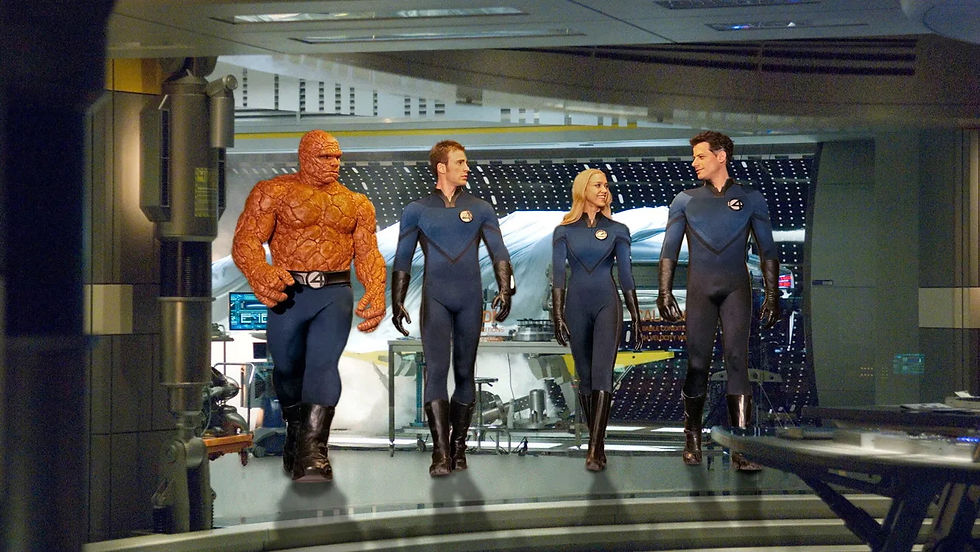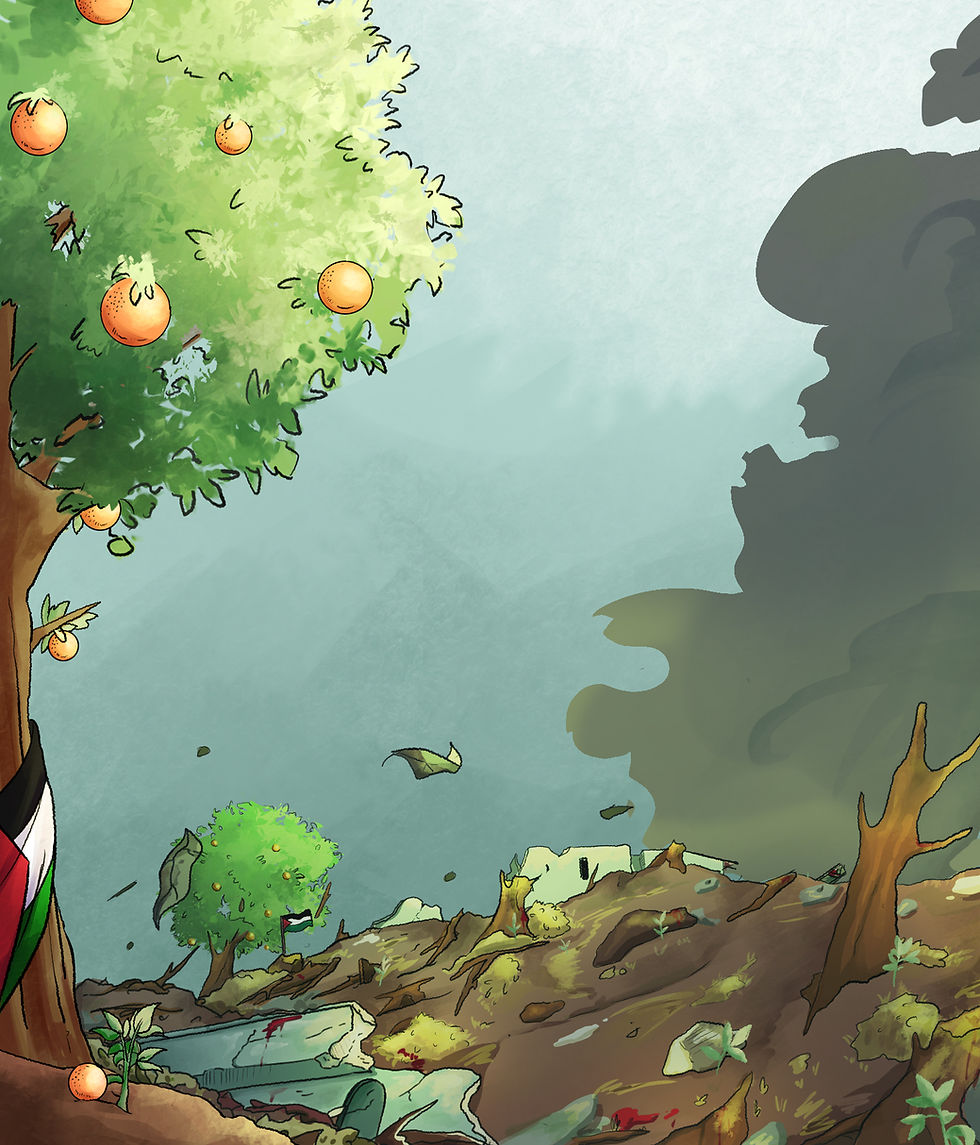The Fantastic Beginnings of Superhero Cinema
- Sam Stashower
- Aug 12, 2025
- 7 min read

When Fantastic Four was released in 2005, nobody knew what to do with superhero movies. The genre was just emerging from the death knell of the 90s, where high-profile disasters like Batman & Robin and Steel had seemingly irrevocably tainted the prospect of a good comic book adaptation. There would have been some gradual turnaround in recent years — most notably X-Men in 2000 and Spider-Man in 2002 — but while popular and profitable on release, these were still seen as outliers in the wider cinematic world, where adult fare like Erin Brockovich and YA adaptations like Harry Potter still dominated the charts.
2005’s Fantastic Four is probably best understood as a response to those movies: a mainstream studio’s attempt to capitalise on their recent unexpected success without quite understanding the catalysts of their popularity. In particular, it feels like someone watched Sam Raimi’s interpretation of Spider-Man, and then tried to replicate it in a “movie studio-approved” way.
Raimi’s Spider-Man works, and continues to be beloved to this day, because of its unprecedented commitment to a pure comic book aesthetic. It’s fearlessly goofy and shamelessly sincere in a way that was rare and earnest both then and now. The best parts of the Fantastic Four movie lean into this goofiness of the premise, but more often than not, it feels like it’s aiming for the broadest possible audience with tacky gags (mostly to do with Johnny’s attitude) or crass, era-specific sexualization of Sue, who loses her clothes, frets about her relationship and …that’s about the extent of what she contributes to the movie.
Some of the mainstream-ification does work, though. In the comics, Doctor Doom has a tremendously convoluted backstory concerning the Fantastic Four: he was Reed’s old college friend who was disfigured in a lab accident, so he ran away and became the dictator of a foreign country. Also, his mom was a witch. In the movie, he’s just an asshole billionaire who funds their trip to space and gets his powers in the same freak accident as the rest of the four.
Comic fans will pull their hair out at any change to the source material, and there is a push-pull here: we do lose the sheer weight of the backstory Doom had, especially in his connection to the FF (Reed especially; instead of academic rivals, now their main beef is that they’re both in love with the same girl). But just for this movie, I think that streamlines things in a way that works. And if we’re being honest, that kind of mainstream-ification inherent to the era wasn’t always the worst thing in the world: I remember people LOST THEIR MINDS when the Sam Raimi movies changed it so that Peter’s webs shot organically instead of coming from a wrist device he had to build…but that’s fine? It works for the movie, and the core of his character still comes through. I’m very much of the opinion that the needs of the movie come way before fealty to what it’s adapting.
Fantastic Four doesn’t seem to have a foothold in the pop-cultural conversation that even something like Batman & Robin had. People remember it, and enough people saw it to warrant a sequel, but you’d be hard pressed to find anyone with a strong feeling towards it one way or another. Even the calls to have Ioan Gruffudd cameo in a future MCU movie felt obligatory, rather than earnestly felt. Really, it’s a better contender than Avatar ever was for having “no cultural impact.”
By contrast, Batman Begins set the course for the entire 20 years of comic book cinema that followed it. Even more so than Iron Man, which came three years later and kicked off the MCU. Batman Begins is the film that most presages the type of superhero spectacle that would come to dominate the silver screen for the next few decades.
Released a mere month before Fantastic Four, Batman Begins was the first film in Christopher Nolan’s enormously influential Dark Knight Trilogy, followed by The Dark Knight in ‘08 and The Dark Knight Rises in 2012. While all three films were popular upon release, The Dark Knight became a cultural phenomenon that eclipsed the two films surrounding it. A combination of Heath Ledger’s iconic performance and the searing grandeur of Nolan’s serious vision — still a novelty for superhero cinema at the time — meant that The Dark Knight was the one that captured the public’s imagination.
But Batman Begins has always been my favourite. I saw someone put it best on social media, when they said something to the effect of Batman Begins being a great Batman movie, whereas The Dark Knight is a great Christopher Nolan movie that happens to feature Batman. It’s a subtle distinction, but a crucial one.
I would argue that Batman Begins is the only live-action Batman movie to center on Batman as the main character; famously, the Burton/Schumacher films were more interested in the colourful villains than in the brooding hero. The Dark Knight was similarly consumed by the gravitational pull of Heath Ledger’s iconic portrayal, whereas The Dark Knight Rises…was just kind of confused and unfocused from top to bottom.
But Batman Begins rests entirely on Bruce’s journey. It has several villains, but they’re all reflections of him and his main motivator — fear. Carmine Falcone, Ra's al Ghul and the Scarecrow all use fear as a weapon to their own ends, some more literally than others (Falcone uses his reputation and fear of reprisals to keep people in line — Scarecrow uses a fear toxin he throws at you) and we get to see how Batman responds to this and adapt to make sure he doesn’t fall into the trap of becoming like them. Many superhero movies feature multiple villains, but unlike Spider-Man 3 or The Amazing Spider-Man 2, Batman Begins never feels overcrowded because of how expertly these characters are woven into the thematic narrative, and how they consistently reflect Bruce’s arc.
Fantastic Four didn’t exactly hide its comic origins, but it tried to sublimate them into a broadly accessible blockbuster style, which just comes off as bland. Nowadays, Batman Begins often gets blamed for helping kickstart the “dark and gritty” phase of superhero movies, which resulted in high-concept blockbusters that all seemed vaguely ashamed of their comic origins, but that’s not a trap this movie falls into. The scenes of Bruce slowly building up his Bat persona, offering painstaking real-world justifications for things like the Batarang or the Batmobile, don’t feel like the film is covering its ass; it feels like we’re having fun seeing how much of this stuff can be transposed to reality.
And it really should be emphasized that for all the film does to ground itself in a recognizable reality, the movie still hinges on a plot that insists that economic disparity was caused by ninjas. This isn’t a dig, by the way — that’s a plotline that can only be achieved in the comic medium, and that’s why it’s awesome. The ‘05 Fantastic Four, meanwhile, is emblematic of the era in that it never feels comfortable in its skin.
Of course, both of these characters have been reimagined again and again in the ensuing years. Interestingly, both of the most recent incarnations have found success by consciously pushing against the norms of modern superhero franchising: Robert Pattinson’s Batman remains stubbornly separate from the wider DC movie universe, cut off from having to interact with whatever James Gunn is setting up. (Honestly, a part of me does want to see him share a scene with David Corenswet, but at this point I’m not willing to risk it. Keep him separate for his own good).
And Fantastic Four: First Steps based so much of its pre-release marketing on emphasizing how this wasn’t an MCU movie: it takes place in the 60s, in an alternate reality. And that’s where it should be allowed to stay, quite frankly. I know it’s a foregone conclusion, but I’d so prefer if the new iteration were allowed to just stay in its own space, telling self-contained stories without us having to worry about how they’re gonna cross over with Shang-Chi or whatever. I was deeply relieved when First Steps didn’t end with the heroes crossing over into the MCU, but it still does end with a title card promising that we’ll next see them in The Avengers 5, and that just makes me sad.
And yet, it would be dishonest not to point out that Batman Begins also ends with a sequel hook, with Commissioner Gordon showing Batman a Joker card, thus setting up The Dark Knight. And yet, Batman Begins carries a level of artistic purity that almost completely eludes every subsequent superhero film. It really does feel like the platonic ideal of what might happen when you give a “prestige director” like Nolan a huge budget and carte blanche to make his kind of blockbuster. That’s why, all these years later, it persists - it feels like a real movie that someone actually made.
Edited by Anish Paranjape
Sam Stashower is a recent graduate student and a writer at Political Pandora. He has contributed film reviews and pop culture analysis to The Quindecim (Goucher College) and The Eagle (American University). A devoted media enthusiast, he can—and inevitably will—find a way to connect everything he watches, listens to, or reads back to Star Trek.
Disclaimer
Any facts, views or opinions are not intended to malign and/or disrespect any religion, group, club, organisation, company, or individual.
This article published on this website is solely representative of the author. Neither the editorial staff nor the organisation (Political Pandora) are responsible for the content.
All illustrations in this piece, if any, are original works created exclusively by the Design Department of Political Pandora.
These illustrations are protected and are not available for replication, reproduction, or redistribution in any form without explicit written consent from Political Pandora. Unauthorized use, including but not limited to copying, modifying, or redistributing, is strictly prohibited.
Photographs in this particular article are taken from external sources and are not a property of Political Pandora. The use of these images are not meant for commercial purposes.
While we strive to present only reliable and accurate information, should you believe that any information present is incorrect or needs to be edited, please feel free to contact us.
References:
Hughes, Mark. ““Batman Begins” Celebrates 20th Anniversary as “Superman” Takes Flight.” Forbes, 13 July 2025, www.forbes.com/sites/markhughes/2025/07/13/batman-begins-celebrates-20th-anniversary-as-superman-takes-flight/. Accessed 25 July. 2025.
McPherson, Chris. “Ahead of ‘the Fantastic Four: First Steps,’ the Movie That Started It All off Came out 20 Years Ago This Week.” Collider, 12 July 2025, collider.com/fantastic-four-20th-anniversary-july-2025/. Accessed 25 July. 2025.
“This Week in Genre History: Batman Begins Was a Real Movie before It Was a Superhero Flick.” SYFY Official Site, 16 June 2021, www.syfy.com/syfy-wire/batman-begins-christopher-nolan-anniversary-realistic. Accessed 26 July. 2025.
Keywords: Batman Begins Movie Review, Fantastic Four 2005 Analysis, Christopher Nolan Batman Films, Sam Raimi Spider Man Influence, Dark Knight Trilogy Impact, Heath Ledger Joker Performance, Doctor Doom Character Changes, Superhero Films Cultural Impact, Comic Book Movie Evolution, MCU Vs Standalone Films, Superhero Genre History, Batman Vs Fantastic Four Comparison, Influence Of Batman Begins On Superhero Movies, Early 2000s Superhero Films, Dark And Gritty Superhero Trend




Comments